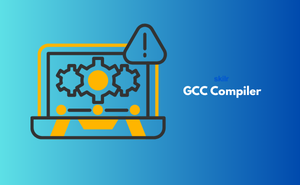👇 CELEBRATE CLOUD COMPUTING DAY 👇
00
HOURS
00
MINUTES
00
SECONDS

The Certificate in GCC Compiler is designed for individuals seeking to enhance their skills in programming and software development using the GNU Compiler Collection (GCC). This certification provides comprehensive training in the principles of compiler design, optimization techniques, and debugging strategies using GCC. Participants will learn how to use GCC to compile and build software applications efficiently.
The certification covers skills such as understanding the architecture of compilers, using GCC for code compilation and optimization, debugging techniques, and writing makefiles. Participants will also learn about the various options and flags available in GCC for different programming languages.
Participants are expected to have a basic understanding of programming languages such as C, C++, or Fortran. Familiarity with the Linux operating system and command-line tools is beneficial but not required. Some programs may have specific prerequisites, so it is advisable to check with the certifying body.
Why is GCC Compiler important?
Who should take the GCC Compiler Exam?
GCC Compiler Certification Course Outline
Compiler Architecture and Design
GCC Overview and Installation
GCC Command-Line Options
Makefiles and Build Automation
Debugging with GCC
Advanced GCC Features
Credentials that reinforce your career growth and employability.
Start learning immediately with digital materials, no delays.
Practice until you're fully confident, at no additional charge.
Study anytime, anywhere, on laptop, tablet, or smartphone.
Courses and practice exams developed by qualified professionals.
Support available round the clock whenever you need help.
Easy-to-follow content with practice exams and assessments.
Join a global community of professionals advancing their skills.
(Based on 356 reviews)
Yes. It gives you practical knowledge of working with GCC in actual software development projects, including debugging and performance optimization.
Yes. You will learn how to create and use Makefiles to automate the build process, especially in larger projects with multiple files.
Yes. Many technical interviews test your understanding of how code is compiled and run. This exam helps you practice real compiler usage and error fixing.
The exam covers compiling code, using compiler flags, linking libraries, debugging errors, writing Makefiles, optimizing code, and working on real-world projects using GCC.
Yes. You should have basic knowledge of C or C++ programming and be familiar with writing, compiling, and running code.
Yes. The exam includes debugging basics using gdb, which helps find and fix issues in compiled programs
This exam is ideal for students, beginner programmers, software developers, and anyone who uses GCC for compiling code in Linux or cross-platform development environments.
This exam checks your knowledge of how to use the GCC compiler to compile, debug, and manage C or C++ programs. It focuses on command-line usage, compiler options, and error handling.